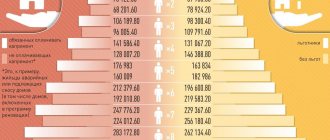Legal requirements for the procedure
The provision of housing and communal services to citizens is regulated by the Rules approved by Decree of the Government of the Russian Federation No. 354 of 05/06/2011. According to this document, the supplier may suspend or limit the provision of services after sending a preliminary notification to the debtor.
The grounds for suspension of the service are considered to be:
- Non-payment within three months.
- Incomplete payment for the same period after receiving notification from the supplier.
- Violation of the debt repayment agreement concluded between the debtor and the supplier.
The same document states that, according to sanitary standards, it is prohibited to suspend the supply:
- cold water;
- heating;
- gas intended for heating;
- sewerage.
Without these services, the premises automatically become unsuitable for habitation, therefore, the Housing Code of the Russian Federation is violated. A direct ban on turning off cold water and heating is contained in paragraph 307 of the Decree of the Government of the Russian Federation.
Utilities have the right to turn off:
- hot water;
- electricity;
- intercom;
- gas intended for cooking.
How is it done?
Restriction or suspension of water supply is possible only if these actions do not cause inconvenience to other owners of the premises and do not create a threat of harm to the common property of the apartment building.
Turning off hot water for non-payment in a separate apartment is carried out by shutting off or welding the pipes . Often, defaulting owners try to prevent utility workers from allowing them into the apartment. But such a position can lead to additional expenses.
The management company can install a plug on the water supply pipe from the basement of the apartment building using a special device. This manipulation is carried out for a certain cost, which managers also collect from the debtor.
As a result, the owner will have to pay the outstanding water payment, late fees and the cost of installing and subsequently removing the plug from the pipe.
Is it legal to turn off water for non-payment?
The implementation of water shutoffs must fully comply with the rules established by law:
- The amount of debt should not affect the disconnection. The only reason is the lack of payment within 3 months.
- If the debtor has not been properly notified of the disconnection 30 days in advance and an additional 3 days in advance, no action can be taken.
Responsibility for illegal shutdown
Russian legal acts provide for punishment for unjustified shutdown of a resource.
Such sanctions are:
- fine – 500-1000 rubles. for officials, 5,000-10,000 – legal, according to the Code of Administrative Offenses, Art. No. 19.1 (arbitrariness);
- 200,000 rubles or imprisonment for 3 years – causing material or moral damage;
- imprisonment for 5 years – the death of a person after illegal actions of an organization.
If hot water is turned off illegally for non-payment, the supplier is obliged to restore the service within three days, recalculate, and give the debtor a month to repay the arrears.
Other reasons for shutdown
It is not uncommon to hear people complaining about water being turned off without notifying them. The reasons for such shutdowns may be emergencies or the threat of accidents in utilities. Hot water may suddenly be turned off due to emergencies in the city. In winter, some areas of the water supply system cannot withstand frost, and cracks appear in the pipes. In small towns, this phenomenon is not uncommon; water from pipes flows onto the roads and freezes. Ice appears on the roads and emergency situations arise. An emergency situation may arise due to a natural disaster. To avoid such global problems with water, water supply systems must be regularly checked, and pipes must be replaced with new ones after their expiration date.
When there is a planned shutdown of cold or hot water in private or apartment buildings, the water supply organization must notify the residents of the building in advance. The corresponding notification must come thirty days in writing, and an announcement about the shutdown must be at the entrance.
The reason for the disconnection may be the unauthorized connection of your equipment to the central riser in the basement of a multi-story building. When people use high-power appliances and the network is not designed to handle such loads, failures and accidents can occur. In such cases, turning off the water is inevitable.
When the amount accrued for payment is not repaid in full, it is also possible to suspend the water supply.
Before repair work and maintenance, residents must be notified of the shutdown of housing and communal services ten days before the work is carried out. When repair work is completed, water supply must be restored within two days.
How to make a claim and complaint?
There are no unified forms for drawing up claims and complaints, so they are drawn up according to the general rules for drawing up business papers:
- The management company's claim is filed in the name of its director. The document contains the following points:
- name of company;
- personal data of the applicant (full name, address, contacts);
- the essence of the claim with references to the norms of law. In this paragraph, it is necessary to indicate the illegality of disconnection due to lack of notification or partial payment;
- the requirement to restore water supply within a specific time frame and recalculate payments for the period of shutdown;
- date and signature.
The claim must be accompanied by a receipt for payment of the invoice (if available).
Sample complaint from the management company about turning off hot water.
- A complaint to the Housing Inspectorate or the Prosecutor's Office is filed after receiving a negative response from the Criminal Code or when the consumer's requirements are completely ignored. It is drawn up in the name of the head of the organization and includes the following items :
- name of company;
- personal data of the applicant;
- description of the circumstances of the case indicating the fact of illegal disconnection. This paragraph describes filing a claim with the Criminal Code and reports the content of the organization’s response;
- please evaluate the actions of the management company’s employees;
- date and signature.
Attached to the complaint is a copy of the complaint sent to the Criminal Code and the response received from it.
- A statement of claim is filed in court after receiving a response from the regulatory authorities. provided that the problem has not been solved or if it is possible to prove the moral damage caused by the shutdown. Such cases are within the jurisdiction of district courts, so you need to contact this organization.
The document is drawn up according to general rules and includes points:
- name of the judicial authority;
- plaintiff's details: full name, residential address, telephone number;
- details of the defendant: full name of the management company, full name of the director, legal address, telephone number;
- statement of claims. This paragraph describes the circumstances of the water supply shutdown, the date of filing a claim with the Criminal Code and the content of the response. You can also describe the circumstances of contacting regulatory authorities. Your own claims must be supported by references to the violated norms of the law;
- We request that the shutdown of water supply be declared illegal on the basis of current legislation.
Attached to the statement of claim are copies of the claim to the Criminal Code and the complaint to the regulatory authorities, as well as the responses received from these organizations.
Standards for disconnecting DHW
The management company cannot turn off the hot water supply without permission. This is a direct violation, as evidenced by legislative acts.
Standards for shutting off hot water:
- Articles No. 12, 13 and 14 of the RF Housing Code define the powers of local government. The documents indicate that repair work cannot last more than two weeks.
- The housing stock must be operated in accordance with Decree of the State Construction Committee of Russia No. 170 dated September 27, 2003 (as amended in 2021). The PP covers the technical side of the issue. Planned or urgent repairs cannot take more than 14 days. In this case, a notice is sent to residents.
- Water supply must be supplied continuously, unless actions are contrary to the hygiene and safety requirements prescribed by Resolution No. 20 of 04/07/2009. (current version 2019).
In case of emergency situations, water is supplied from backup sources. They must be provided in advance. During an accident, the 14-day period may be extended. The standards are prescribed by Articles 13 and 20 of the RF Housing Code. State bodies are required to control the process in accordance with the law.
Reasons and reasons
The permissible duration of a hot water supply interruption is a maximum of two weeks. This will be legal if the utility companies have grounds. The organization has the right to turn off the water supply at any time during an emergency.
There are also secondary reasons:
- Utility workers' mistake.
- Unauthorized blackout.
- Emergency situation on internal communications.
- Emergency outside the MKD.
- Natural disasters.
Please note: incorrect actions by the consumer can also become a factor in stopping the supply of hot water.
In what cases is a DHW shutdown considered an emergency?
The maximum period for shutting off hot water by law is 14 days. Most often, supply interruption occurs in emergency situations.
Emergency blackout allows you to minimize the damage caused by a pathogenic situation, for example:
- leaking pipes;
- damage to the water supply system;
- break in the main line;
- fire;
- incorrect connection.
If utilities are disconnected, then information about the duration of repairs can be found through the management company. Management Company is a supplier for MKD, but takes resources from Vodokanal. It happens that the reason is related to the main RSO.
Disabling DHW in winter and summer
During the summer, they have the right to turn off hot water in case of scheduled repairs or maintenance work. Many management companies schedule system diagnostics during the warm season, when most residents go on vacation or relax at their dachas.
Actions will be legal if the owners of an apartment building or village were notified in advance using notifications. The company must do this ten days before the start of work. The management company is also obliged to post a notice notifying that prevention will be carried out.
Permissible interruption in DHW supply
Some people do not know for how long hot water can be turned off according to the law and begin to write complaints to the management company.
In order not to be unfounded, it is worth considering health norms on this issue:
- SNiP 2.04.02-84 (in the 2021 version) states that a break in any period should not exceed eight hours. Here we are talking about summing up the time for a month. That is, if utility workers turned off the water twice a week for 1 hour, then the norms were violated.
- SanPin 2.1.4.2496-09 talks about safe resource indicators and requirements for drinking water. If an accident occurs and the water supply does not meet safety parameters, then repairmen are allowed not to restore the supply for two days until the situation changes.
Every management company is required to comply with these standards.
Procedure for turning off water for non-payment
Restriction of water supply to the defaulter is carried out in the following order:
- The debtor is sent a notice of the expected suspension of water supply if the debt is not paid within 30 days. The warning is delivered by registered mail or handed to the addressee against signature.
A properly drafted warning should contain the following points::
- full name of the debtor;
- residential address;
- account number;
- debt period;
- amount of debt;
- debt repayment date.
- If the debt is not repaid within the allotted time, the service provider will limit it, if such a technical possibility exists. The management company is obliged to additionally warn the consumer 3 days before the proposed actions.
- The water supply restriction is valid for 30 days . If the debtor does not take action to pay the debt within the allotted time, the water is turned off.
- Suspension of water supply does not mean that the debtor may not pay the resulting debt. The supplier has the right to recover funds through the court.
Is it legal to turn off water for non-payment?
The conditions for limiting the provision of utility services are regulated in a special decree of the Government of the Russian Federation No. 354 of May 6, 2011. This resolution approved the Rules for the provision of public services. They require, in particular, to turn off hot water, turn off sewerage for debtors and other communications only in the event of debt on housing and communal services for more than 3 months.
The impossibility of turning off the sewerage system is ensured by the requirements of the Housing Code - an apartment without a sewerage system does not meet the parameters of a residential premises, therefore, a citizen’s housing rights are violated.
Thus, the list of disconnected utilities includes:
In order for the debtor to administer the trust, three conditions must be met:
- there will be no damage to common property;
- no restrictions will be introduced for bona fide payers;
- sanitary standards in the debtor’s apartment will not be violated.
In any case, before disconnecting utilities, suppliers must notify the debtor in writing about this 20 days in advance and obtain his signature that the warning has been received. If the debtor refuses to sign for the notice, suppliers can send him certified mail with the notice. If there was no written warning, suppliers have no right to restrict the debtor.
When turning off hot water, the easiest way is to weld the pipes. However, the debtor may not allow representatives of the management company to enter, and they cannot enter by force, since the owner’s right to the inviolability of the home will be violated. In this case, suppliers usually resort to a simple but rather expensive method: inserting a special plug through a pipe in the basement into the debtor’s riser. An invoice for the transaction performed is issued to the debtor. Thus, the total amount of debt increases.
When will the payment for water supply be recalculated?
This is possible in the following situations:
- If the maximum permissible interruption in hot water supply has been exceeded. In this case, the payment is reduced by 0.15% of the amount that was calculated for each hour exceeding the permissible period.
- If there is a deviation from the temperature standard, then for every 3 degrees of deviation the payment amount is reduced by 0.1%.
- In cases where the water temperature at the point of analysis is below 40 degrees Celsius, payment for the entire period is made according to cold water standards.
- In cases where the pressure in the water supply differs from the standard by less than 25%, the payment is reduced by 0.1% from the standard. If the pressure drops by more than 25%, it is considered that the service provided is of inadequate quality.
Procedure for turning off water supply
A written notification to the debtor from the housing company must contain the following sections:
- full personal name of the citizen;
- its registered address;
- personal account symbols;
- debt continuation period;
- amount of arrears;
- the date of its repayment.
If there is no payment within the time specified in the warning, the utility supplier makes a limitation, if such a technical possibility exists. However, the user must be informed at least three days before the intended procedure.
The restriction on economic needs is valid for 30 days. If repayment is not observed within the allotted period, the housing organization disconnects hot water for non-payment in a separate apartment. The termination of the supply of economic needs to the debtor does not mean automatic cancellation of the debt for the latter. If there is no further payment, the utility service may go to court.
How are penalties usually charged?
According to the law, a citizen is charged a penalty for non-payment or late payment of housing and communal services. This is regulated by part 14 of article 155 of the Housing Code of the Russian Federation and paragraph 159 of the rules approved by Decree of the Government of the Russian Federation dated May 6, 2011 No. 354.
The amount of penalties depends on the refinancing rate of the Bank of Russia and on how many days the payments were overdue: the longer you do not pay, the larger the penalties will be. By law, they are imposed for each day of delay, starting from the 31st day following the day of the due date for payment, until the day of actual payment.
Legislation of the Russian Federation on the period of suspension of hot water supply
Don't understand the article or need help? Ask our in-house lawyer a question through the Online Consultant form or leave a comment. We will definitely answer!Ask a question >>>
Utilities can turn off hot water by law, but for no more than 8 hours a month. There is also an hourly limit. The supply of hot water or cold water is stopped for a total of no more than 4 hours a day.
There are amendments and reservations in this regard, which are prescribed by law in regulations. Moreover, it all depends on the time of year: winter or summer. During the hot period, preventive maintenance of the water supply is carried out, and pipe replacement is prescribed. It is allowed to increase the duration of blackout.
The management company can turn off hot water according to the law, although according to the requirements of SanPiN 2.1.4.2496-09 (as amended in 2021), the supply of the resource should not be stopped without reason. If the situation is emergency, then repairmen are required to fix the problem within eight hours. This is a maximum period of months.
The legislation provides exceptions to the rules:
- Major renovation. The work is carried out according to plan, residents must be notified in advance.
- Prolonged events during an emergency, for example, a pipe burst.
- Prevention is carried out only in summer, but the reservation applies to hot water supply. Utilities are required to meet the deadline within 14 days.
All these nuances are regulated by Decree No. 354 of the Government of the Russian Federation; the permissible periods for interrupting the supply of hot water supply are indicated in Appendix 1, section II, clause 4. If the management organization violates the conditions, then the owner has the right to write a complaint and demand a recalculation in the receipt.
You can file a claim with Rospotrebnadzor. However, an application for recalculation of payment should be written to the housing office on whose balance sheet a private house or apartment building is located.
Restriction and suspension of public services
Also, for non-payment, a person may be suspended or limited in the provision of utility services. The rules by which this is done are established by the Russian government.
When limiting the provision of a utility service, the contractor temporarily reduces the volume (quantity) of supply of a certain utility resource and (or) introduces a schedule for the provision of utility services during the day (with the exception of cold water supply and heat supply). For example, hot water will only be turned on from 07:00 to 09:00. The specific time is chosen by the management company itself.
When a utility service is suspended, the supply of a specific utility resource is temporarily interrupted. At the same time, the executor is obliged to seal the relevant equipment used by the debtor consumer. For example, an employee of the management company may come and put a plug on the sewer, even without access to the apartment, from the attic.
At the same time, suspension or restriction of the provision of utility services does not constitute termination of the contract for the provision of utility services.
A notice of suspension or restriction is sent to the owner or tenant of the apartment, and penalties are usually followed after 20 days for non-payment.
How to write a claim or complaint against a management company?
A claim against the actions of the service provider is drawn up addressed to the head of the organization in two copies. One, signed by an authorized employee of the management company, remains with the client, the second is transferred to the housing and communal services authority.
The complaint must include:
- The name of the legal entity and the name of the director (to whom the appeal is sent).
- Substantiation of the claim . The payer expresses why he is dissatisfied with the activities of the housing and communal services body, and gives arguments, referring to the legislation of the Russian Federation. It is recommended to attach certificates (payment receipts, for example) confirming the illegal actions of utility workers.
- Owner's demands : restoration of access to water supply, compensation for damage, recalculation.
- Date and signature of the applicant.
If the management company refuses the payer’s demands, a copy of the application is sent to Rospotrebnadzor or the prosecutor’s office, with the supplier’s decision attached.
What to do if your application is refused?
Upon consideration of the complaint, the supervisory authority can give either a positive or negative answer . In addition, in some cases the complaint may not be considered at all.
We are talking here not only about the incorrect execution of the document, but also about the lack of prior application by the user to the Criminal Code. If the complaint was nevertheless accepted for proceedings and an investigation was carried out into the illegal actions of the water utility, then a refusal can follow only under one condition - if the supply company can prove that its employees acted within the law.
As for a negative response to a complaint, it must be provided in writing and must include not only the sealed signatures of the performer and manager, but also the reasons for the refusal. Moreover, each of these factors must have a legislative basis.
Upon receipt of such a notification, the consumer can take 2 paths - either pay off debts or go to court . The claim should be filed at the location of the MKD within 10 days from the date the authority that considered the complaint issued a negative decision.
As you can see, turning off the water supply is accompanied by a number of problems, the solution of which may take more than one day. However, you can save yourself from additional difficulties - all you need to do is pay your utility bills on time.
The water was turned off without warning: what could it be?
First you need to find out why the water supply was turned off. There can be many reasons for this. Let's look at the most common of them:
- Carrying out preventive work. Utilities are required to periodically carry out such work to identify and correct problems with the water supply system. At the same time, they must warn citizens.
- Carrying out repair work. As a rule, repair work takes longer and involves the elimination of serious pipeline problems.
- The occurrence of emergency situations that require rapid elimination.
Reference. Typically, such work is carried out in the warm season (from late spring to early autumn). Services are required to warn citizens in advance.
How can the Criminal Code be punished?
The housing inspection may punish the management company in accordance with the Civil Code:
- fine to a person holding a responsible position (for example, director) - one thousand rubles;
- in the name of a legal entity - ten thousand rubles.
Judicial authorities can involve the management company in accordance with the Criminal Code:
- fine to a person holding a responsible position (for example, director) - no more than eight ten thousand rubles;
- in the name of a legal entity - no more than two hundred thousand rubles;
- changing personal housing to government bunks for at least two years, but not more than five years - if the court recognizes the circumstances as aggravating.
The penalties are quite serious, so problems with utility services are often resolved pre-trial. But if the case does end up in court, it is better to enlist the support of a qualified specialist.
Mitigating Factors
You can always reach an agreement with the utility service if the consumer has objective reasons for delaying payments and does not refuse to repay the debt. Mitigating circumstances will be considered:
- All able-bodied citizens registered in housing earn amounts less than the subsistence level. Then they can qualify for low-income status and take advantage of subsidies from the state. It will take on part of the rent that exceeds the maximum established by law.
IMPORTANT! The law does not have retroactive effect, that is, the subsidy will be valid from the moment of registration, but there will be no recalculation for previous accruals. The debt will have to be paid in full.
- Delay of wages at the debtor's workplace. To do this, you must submit the appropriate certificate to the RSO. Then he will be given a deferred payment and the water will not be turned off.
- Accommodation in an apartment for a minor child or a disabled person. The law prohibits shutting off the water in this case.
- Temporary difficulties with the employment of citizens, provided that they take measures to solve the problems.
- Difficult financial situation for objective reasons.
Procedure of the management company
Companies that provide utility resources can limit owners' access to them for non-payment or simply temporarily disconnect them (for example, while repairing utility lines).
For non-payment
If the supplier decides to take measures against the defaulter in the form of turning off hot water for debts, he must notify the debtor about this in writing. Disconnection can be carried out only twenty days after the owner is notified. Confirmation is the personal signature of the debtor or a receipt of receipt of a registered letter.
Turning off water without written notice is a direct violation of Russian legislation.
How can you turn off the water in one apartment and not affect the other residents of the apartment building? The best option is to weld the pipe in the owner’s apartment. But without his permission it will be impossible to get there. And few people will voluntarily allow housing office representatives into their apartment to carry out such manipulations. You can also block the owner's riser in the basement. In this case, utility companies will suffer certain damage, which will then be recovered from the defaulter. So, if the case goes to court, this amount will also be added to the debt.
Temporary shutdown
Temporary shutdown of water supply to the entire house can be carried out by the service provider without prior notification to the residents of the house in the following cases:
- emergency situations/natural disasters, when the life/health of residents of an apartment building may be in danger;
- the possibility of an emergency situation when the life/health of residents of an apartment building may be in danger (for example, a boiler room caught fire).
The water supply to a specific user can be disconnected by the service provider without prior notification to the resident in the following cases:
- unauthorized connection to a water supply source;
- finding that the water supply systems passing through the apartment of a particular owner are in faulty/emergency condition;
- provided that the owner, through his actions, created an emergency situation;
- provided that the owner has changed communication structures without obtaining special permission (including it is prohibited to install heated floors in the bathroom without approval);
- at the request of authorized structures.
All other situations of temporary shutdown of water supply require the start of work only three days after notifying the owners. For violation of these settings, you can write a complaint against the management company or file a statement of claim.
Why do you turn off hot water?
Government Decree No. 632, Section III, stipulates the reasons why the supply of hot water may be temporarily stopped. There are different situations when it is necessary to turn off hot water in winter. Most often, blackouts are associated with accidents and urgent repairs.
Read more: Low-rise construction, how many floors are there maximum?
First of all, residents should be notified about this. The announcement indicates the causes of the accident and the time when the DHW supply will be restored. The duration of the daily break should not exceed four hours, but emergency situations do occur.
Watch the video: “Who turns off the hot water and why.”
How to distinguish between legal and illegal shutdowns
When the management company plans to turn off the water, it notifies the people living in the house in advance about the planned work. If one of the residents does not pay for housing and communal services on time, he receives a warning that the company may suspend water supply. The management company has the right to such sanctions. Water can be turned off only after a written notification, provided that the debtor has accepted and signed it.
Other cases of turning off water without warning, except in emergency situations, are considered illegal.
If a violation of drainage occurred due to the fault of the housing and communal services or service provider, then you should immediately contact the management company with a statement in writing. In your statement, you can safely rely on Resolution Three Hundred and Seven, which came into force in 2011. You should unite with your neighbors; a collective statement signed by all residents will be considered faster. The letter must ask to restore the water supply and recalculate the rent for the period when the water supply was suspended.
Where to call?
Having discovered that the water supply has been stopped, you should not panic, but you just need to know who to contact for clarification and elimination of the problem with the water supply.
If the house is managed by a management company, then you can find out the reason for the lack of water or report other problems with it by calling the dispatcher .
If the HOA is present in the house, you can call the chairman of the association.
The payment receipt also contains phone numbers where you can contact and get answers to questions about water supply. In all cities there is an emergency dispatch service , which can also provide explanations.
The procedure for turning off water for non-payment, how is it carried out?
Currently, there are “Rules for the provision of public services”. Paragraph fourteen of these rules discusses the process of suspending or disconnecting water to consumers.
By law, almost all services can be disconnected. The shutdown list does not include apartment buildings and heating in winter.
Unless other conditions are provided for in the agreement, the procedure for turning off water for non-payment follows these points:
- The company that provides this resource must send the debtor a notice indicating the amount owed. If this invoice is not paid within a month, then sanctions will begin to be imposed to limit the services provided.
- If payment has not been made, the provision of water supply services is terminated completely. The debtor is sent a notice indicating that he has three days to pay the debt, after which the water supply will stop.
- The next step is to seal all equipment and metering devices that relate to the housing of this defaulter.
- An important point is that when all debts are paid, the seals must be removed free of charge. As the practice of sealing shows, very often companies issue bills for removing seals, guided by the population’s ignorance of their rights. Such actions are a violation on the part of the service provider and must be punished.
Expert answers
You can use water.
According to Art. 274 of the Civil Code of the Russian Federation, the owner of a land plot has the right to demand that the owner of a neighboring plot provide the right to limited use of the plot (easement). Encumbering a land plot with an easement does not deprive the owner of the plot of the rights of ownership, use and disposal of this plot. An easement is established by agreement between the person requiring the establishment of the easement and the owner of the neighboring plot. If an agreement on the establishment of an easement is not reached, the dispute is resolved by the court based on the claim of the person demanding the establishment of the easement.
An easement can also be established in the interests and at the request of the person to whom the plot is granted the right of permanent (perpetual) use or lifelong inheritable possession. The owner of a land plot encumbered by a private easement has the right to demand proportionate payment from the persons in whose interests the easement is established, unless otherwise provided by federal laws.
Rashid Gafarov
Hello, please tell me. The neighbors periodically, due to swearing, turn off our water whenever they want and for how many hours is unknown. And no one has water. Although the water pipe goes from the central vent to three apartments under a private house, it’s been around 40 years. I called the water utility, they told me that this is private property and figure it out yourself. I went to the police and it was also useless. Do neighbors have the right to be so arbitrary? And where should you go to resolve such situations? thanks in advance
Valid reasons for non-payment
To avoid sanctions for non-payment and other penalties being applied, the person must prove that he has good reason for non-payment.
| For water supply (utility payments) | Family income is less than the subsistence level | Respectful, if they have documented the fact of non-employment |
| For water supply (utility payments) | The employer does not pay wages for a long time | Respectful if you provide proof of employment |
| For water supply (utility payments) | Presence of small children, pensioners or disabled people in the family | Respectful |
| For water supply (utility payments) | Having children over 18 years of age as dependents | Disrespectful in the absence of certificates from the labor exchange |
There are cases when the family income is below the subsistence level. Thus, if a family’s income does not even reach the lower level of the subsistence level, the family is considered poor. Low-income families are provided with benefits for services. It is imperative to confirm that family members are not employed. Each family member is required to provide certificates of their income. Such certificates are issued at employment centers or at the place of training. The certificate also needs to indicate the number of children under working age.
Very often, employers delay payment of wages to their employees. If a person cannot pay utility bills on time due to his employer, because he does not have enough finances, then these circumstances are considered valid. A mandatory condition in this case is the provision of a certificate from the place of employment indicating the period from which the employee will not be given money.
If you fall into debt, having dependents softens the terms of payment. If your family has small children who directly depend on you and your income, and you have not reached the subsistence level, then the state provides assistance to such families. If you have elderly relatives of retirement age or disabled people living with you, this is definitely a valid reason for the debt. In such cases, the state provides one-time one-time assistance in the form of financial assistance. This lump sum cash payment is called a subsidy. It is issued for six months for each family member. If the rent debt continues to grow after two months after the provision of financial assistance, subsidies are canceled and penalties are introduced.
Supplier Responsibility
Unlawful disconnection of citizens from water supply entails administrative and, sometimes, criminal liability. Here we are talking about Article 19.1 of the Code of Administrative Offenses and Article 7.23 on violation of the rules for servicing the population of the Russian Federation. Involvement under these articles is punishable by a fine of one thousand Russian rubles for individuals to ten thousand rubles for legal entities.
Articles 215.1 and 330 of the Criminal Code of the Russian Federation, also concerning arbitrariness and limiting the source of livelihood of the population, imply fines in the amount of eighty to two hundred thousand for officials. As mentioned above, if there are aggravating circumstances, the official may be imprisoned for a period of two years, and if his actions lead to death - for five years.
Minor fines fall within the competence of the Housing Inspectorate, while sanctions against officials and criminal liability are the domain of the judiciary.
Thus, not only respectable payers who find themselves in a difficult situation through no fault of their own can restore justice. Even debtors have legal rights, and preventive measures against them must be applied strictly in accordance with the rules and legal requirements. Otherwise, they can not only challenge the actions of the management company, but also demand punishment for it. However, it should be understood that even with the most successful outcome, no debtor is released from the obligation to repay the debt in full.
What should the owner do?
If water is turned off for no reason or due to debt, but without following this procedure, you must immediately file a complaint with higher authorities.
However, first of all, you should officially contact the management company with a request to resume the supply of the resource on the basis of an unlawful shutdown. In addition, the consumer has the right to demand a recalculation for the time when his water was turned off due to the fault of the management company. If resource stations are also blocked within three days, you can contact higher management structures. For example, to Rospotrebnadzor, the Housing Inspectorate, and the prosecutor's office. The most extreme measure is to file a claim in court. However, for this it is necessary to prepare copies of written statements, complaints, claims to other institutions, copies of their official responses and other documentary evidence of violation of their rights and measures taken.
What is also important for consumers to know is that the rules for turning off water state that this procedure is only possible if the debtor has not paid anything at all for the resource for three months. This means, if at least some amount was received into the current account, even a couple of tens of rubles,
What to do if the water is turned off illegally?
If the water supply in an apartment building is interrupted without compelling reasons, the consumer should follow a certain algorithm.
First you need to draw up an application written to the head of the supply company. Vodokanal employees have no more than 3 working days to review it.
If the situation is not resolved during this period, you can file a complaint with Rospotrebnadzor, the State Housing Inspectorate, or the prosecutor's office.
Better yet, write a complaint to all authorities at once, indicating all 3 addressees in the upper right corner. Then you can be sure that your application will be seen by each of the structures, and therefore it will definitely not go unanswered. There is no set standard for filing a complaint, so most consumers use a complaint form .
So, in the upper right corner the name of the authority, position, full name of its chief, as well as the full name of the injured party are indicated. The name of the document is written in the center of the sheet - “Complaint”. Then the text begins, consisting of 2 parts - informative and pleading. The first states that such and such an organization carried out an illegal water shutoff, and provides reasons why the applicant considers these actions illegal.
In addition, you should describe in detail all the circumstances surrounding the emergence of debt and the subsequent cessation of water supply, as well as indicate the amount of the debt and methods of repaying it (both full and partial).
As for the pleading part, it contains a request to cancel the illegal water shutoff and restore the violated consumer rights. At the end there is a date and signature of the applicant.
Attached to the document itself are copies of all receipts for debt and debt repayment, as well as a copy of the application submitted by the consumer to the management company.
Upon filing a complaint, a corresponding check is carried out . If any violations are detected in the operation of the water utility, Rospotrebnadzor or GZHI will force it to resume water supply, and the prosecutor’s office may even initiate legal proceedings.
A copy of the statement submitted to the company responsible for shutting off the water must be included with the complaint.
The claim itself is considered in 2 stages. The first one, about acceptance of the document for production, takes up to 5 working days. The second, which involves considering whether the water supply to the applicant was legally turned off, can last about 1 month.
However, this does not mean that residents will have to remain without water during this entire period . As a rule, it is connected immediately after the start of the test. If in the future it turns out that the actions of the management company were illegal, the organization itself will pay for the reconnection.
Even if the water supply was stopped illegally, under no circumstances should you connect it yourself! According to the legislation in force in Russia in 2020, such amateur activity is fraught with quite serious consequences: in the case of successful completion of the work - a fine of 10-15 thousand rubles, and in the presence of violations, leading to flooding of residents and the destruction of the water supply system – forced collection of funds to repay the damage caused.
In what dangerous situations does the contractor have the right to immediately stop the supply of resources?
The norms of clauses 104, 116 of RF PP No. 354 also apply to cases of disconnection of a house from the supply of utilities or interruption in the provision of services due to natural disasters and emergency situations.
The definition and classification of natural disasters and emergencies are given in the Federal Law of December 21, 1994 No. 68-FZ “On the protection of the population and territories from natural and man-made emergencies” and in GOST 22.0.03-97 “Safety in emergency situations. Natural emergencies. Terms and Definitions".
An emergency situation in the territory may arise due to natural disasters, as well as accidents and disasters that lead to loss of life, damage to people's health and their property. Emergencies include transport accidents, fires, explosions, releases of hazardous substances, landslides and collapses (Article 1 No. 68-FZ).
Natural disasters include phenomena that do not depend on human will: earthquakes, floods, mudflows, landslides, landslides, avalanches, volcanic eruptions, tsunamis, tornadoes, typhoons, forest and peat fires and other natural phenomena of significant scale (clause 3.1.6 , 3.2–3.4 GOST 22.0.03-97).
The right to stop the supply of CP to an apartment building or separate premises without warning consumers is acquired by the CP contractor from the moment a disaster or emergency occurs, as well as, if necessary, to localize a dangerous situation or eliminate its consequences (clause “b” of Article 115 of the RF PP No. 354) . Consumer disconnections in such situations are carried out without warning, but must be recorded in the appropriate log book.











